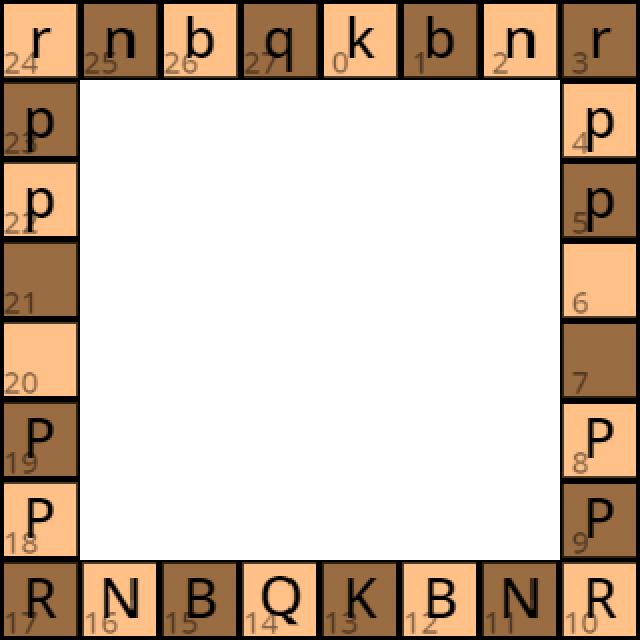Loop Chess
In my quest to find a a good 1-Dimensional chess, I've found that they often lack complexity, or are impossible to play on a standard chess board. I was tinkering with my chess board, and was inspired by the "Border Queen" peice from a collection of variants entitled "Ohio Chess". The border queen can move to any edge or corner tile. That got me thinking about making a whole game of chess played only on the borders. That is where Loop Chess was born.
Setup

Pieces
Pawns can move to either an adjacent, unoccupied square, or can capture a piece two tiles away.
Rooks can slide any distance along the board, like a rook in regular chess.
Knights can either move to an adjacent tile, or leap 3 tiles away.
Bishops move like rooks, but they slide two tiles at a time. This essentially means they leap 2 tiles repeatedly, allowing them to quickly get behind enemy lines.
Queens have the movement options of both rooks and bishops.
Kings can either move to an adjacent tile, or leap two tiles away.
Rules
The game is won by capturing the king. (However, you can use a system of check/checkmate if you so please.)
Pawns can be promoted by moving to a square that is 13 or 14 tiles away from it's own king. For example, if white's king is on tile 4, then the tiles 17, 18, and 19 are all valid squares for promotion. A pawn can be promoted either by moving a pawn into a promotion square, or by moving the promotion square onto the pawns by moving the king.
Tiles are numbered by starting with the black king's tile as 00, and tiles get bigger as you move clockwise, with black's queen starting on 27.
Move notation is done by stating the starting tile and the ending tile. If one of those is one digit, add a zero. So, if white's first move was moving their kingside pawn forwards, that would be denoted as 0807.
Notes
Here is an interactive version of Loop Chess, made in scratch. It uses the notation described above, and also explains how the peices move.
https://scratch.mit.edu/projects/975383904/fullscreen
It appears that someone else also made a very similar variant, nearly two decades ago. I had no knowledge of his variant until after I first submitted this page for review. It appears me and him had very similar ideas in the way of making pieces move. Here is a link to the variant I am speaking of: https://www.chessvariants.com/shape.dir/oneringchess.html
 This 'user submitted' page is a collaboration between the posting user and the Chess Variant Pages. Registered contributors to the Chess Variant Pages have the ability to post their own works, subject to review and editing by the Chess Variant Pages Editorial Staff.
This 'user submitted' page is a collaboration between the posting user and the Chess Variant Pages. Registered contributors to the Chess Variant Pages have the ability to post their own works, subject to review and editing by the Chess Variant Pages Editorial Staff.
By Rose Thorpe.
Last revised by Rose Thorpe.
Web page created: 2024-03-02. Web page last updated: 2024-04-25
